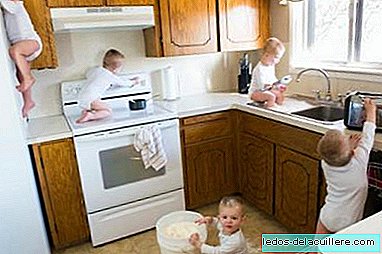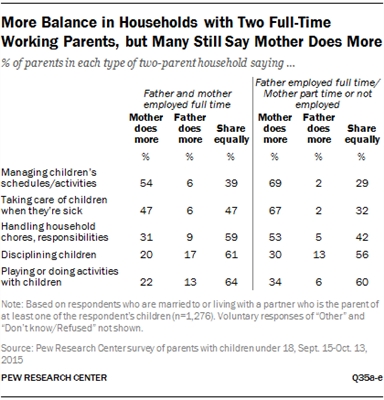One of the questions we ask some women is whether Being working mothers will positively or negatively influence the upbringing and development of our children. In fact, many make the decision to leave their positions to devote themselves completely to them, thinking that it is the best option for them, but studies conducted in the United States have just revealed that this may not be entirely true.
Such research, compiled in a New York Times article, indicates that in addition to the economic benefits, Children also have social and educational advantages when their mothers work. They do not indicate that parents who spend a lot of time with their children do not have benefits, but that in the first case there are other types of compensation.
One of the studies mentioned was performed by the Harvard Business School. This included 50,000 adults in 25 countries and it was observed that the daughters of working mothers completed more years of education, were more likely to be employed in supervisory roles and earned higher incomes. As for the sons, it was observed that as they grew older they spent more time taking care of children and domestic work.
Another fact to mention is that the children of working mothers in those countries spent one more hour a week taking care of family members and 17 more minutes a week in housework, which, according to the research, leads to think that increasing women's participation in the workforce could lead to more stable marriages
According to one of the researchers, this is a clear sign that parents' behavior sets the guidelines that our children follow in their lives:
"This is our best clue that what is happening is a true behavioral model of the skills that parents transmit, such as how they can cope with the various demands of work and home."
In another investigation it was observed that children raised by working mothers were significantly more likely to have a working wife. Men might have preferred to marry a working woman, according to them, for 'making a better team'. "If you want to work, the best way to find a supportive environment for this is to marry a man whose mother does the same."
From studies to reality
The feeling left to me after reading these conclusions is that the study is incomplete. Personally I believe that each of the two options (work or stay at home), has benefits and disadvantages for both parents and children. That is why a complete study should cover the consequences of both one and the other, because you are left with the feeling that the best way to go is to go to work outside.
Also in the conclusions there has been little talk about those 'rewards' that we do to our children for not being with them all day. They clearly refer to the famous 'quality time', (where I can not fail to recommend this article that our partner Armando wrote some time ago), but I have doubts about what they consider to be the right thing or the "minimum".
Although I know that these types of studies are intended to give an overview of the situation of families, I think it is very difficult to generalize and give a clear conclusion as 'the best thing for a child is for his mother to work away from home': it is not taken into account if in fact the woman does it for her personal satisfaction or because it is the only option she has (economically speaking), since the personal development of a woman can be very diverse: for some it can be to dedicate her life to her family and for others to combine the home with her professional career.
The only thing I know is that for a child all the time he can spend with his parents is enriching, and that it is impossible to measure. I am the daughter of a working mother who was unemployed for a while ... when I resumed her career I missed her very much and although she never stopped being present as long as I could, I still remember the sadness I felt for not being able to continue sharing Afternoons with her and how happy she felt when they arrived on weekends and she didn't let go of her side: probably for a child the amount of time she needs from her parents is more than we imagined.
Perhaps the most important thing is to find the balance: personal development is essential to feel good about yourself, and although I know that it is really difficult to decide by self-conviction if we want to work or stay at home (for economic reasons, primarily), in the end the only tool we have is Be clear about our priorities when sharing our time.












